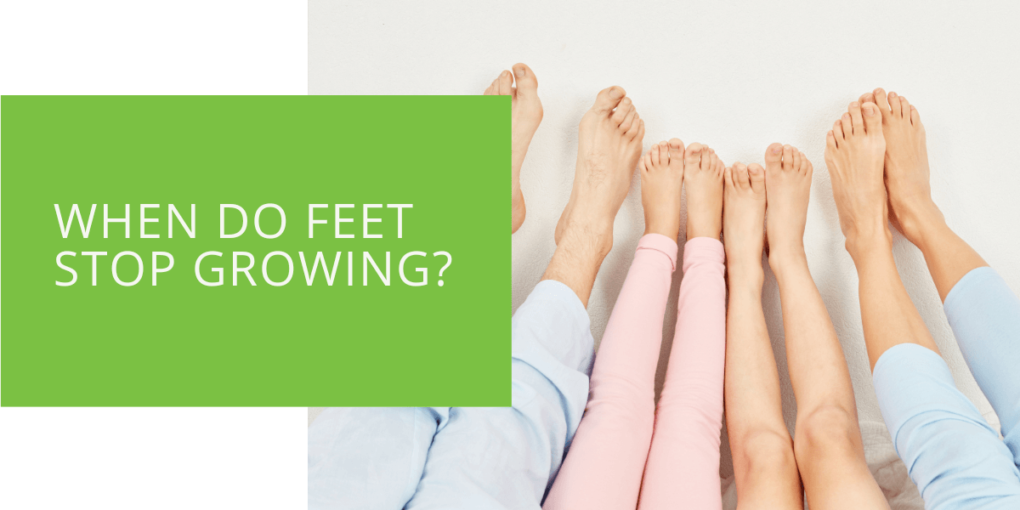When Do Feet Stop Growing?
Feet, the foundation of our body, undergoes significant changes as we age. Understanding when feet stop growing is crucial for proper foot care and overall health. In this comprehensive guide, we'll delve into the intricacies of foot growth from early childhood to adolescence and explore factors influencing foot size and health.
Key Takeaways
- Foot growth is a dynamic process that begins early childhood, continues through adolescence, and may persist into early adulthood. Monitoring growth patterns, choosing properly fitting shoes, and seeking professional guidance are essential for maintaining foot health.
- Various factors influence foot growth patterns, including genetics, hormonal changes, and lifestyle habits. While growth plates typically close around the end of puberty, individual variations may extend foot growth into early adulthood.
- Preventing foot problems involves promoting healthy lifestyle habits, such as regular exercise and balanced nutrition, and prioritizing proper foot care practices, including wearing well-fitting shoes and seeking regular podiatric evaluations. Early intervention and proactive management can help mitigate potential foot issues and support overall foot health.
Foot Growth in Childhood
The Phenomenon of Growing Feet
During early childhood, foot growth is rapid and dynamic. Toddlers experience notable changes in foot size and structure as they learn to walk and explore their surroundings. Growth plates at the ends of bones play a pivotal role in facilitating this growth by allowing bones to elongate gradually.
Growth Patterns in Children's Feet
As children grow older, foot development continues at a steadier pace. Growth spurts, often occurring during growth milestones or puberty, can lead to temporary increases in foot size. Parents need to regularly monitor their children's foot growth and ensure proper footwear to support healthy development.
Adolescence and Foot Development
Transition Period: Adolescence
Puberty marks a significant phase in foot development. Hormonal changes during puberty can influence foot size and shape. Some adolescents may experience sudden growth spurts, resulting in larger feet. Proper foot care and appropriate shoe selection are essential during this period to accommodate changing foot dimensions and prevent foot problems.
Puberty's Influence on Foot Size
The onset of puberty triggers hormonal changes that can affect the body's growth patterns, including foot size. While foot growth typically slows down after puberty, it's common for some individuals to experience continued growth into their late teens or early twenties. Genetics, nutrition, and overall health can influence the timing and duration of foot growth.
Managing Foot Growth Spurts
During growth spurts, adolescents may notice rapid increases in shoe size and changes in foot shape. It's essential to allow room for growth when purchasing shoes to prevent discomfort and potential foot problems. Regular foot measurements and evaluations by a podiatrist can help monitor foot growth and address any issues promptly.

Determining the End of Foot Growth
Factors Influencing Foot Growth
Several factors contribute to the cessation of foot growth. While growth plates typically close around the end of puberty, foot growth may continue for some individuals into early adulthood. Genetics, hormonal fluctuations, and lifestyle factors can influence the timing and duration of foot growth.
Signs That Foot Growth Has Ceased
Determining when feet stop growing can be challenging, as individual growth patterns vary. However, certain indicators, such as a stable shoe size over an extended period and the absence of noticeable changes in foot length or width, may suggest that foot growth has peaked. Regular foot examinations and consultations with a podiatrist can provide insight into foot development and health.
Shoe Size and Foot Growth
Implications for Shoe Fitting
Properly fitting shoes support healthy foot development and prevent foot problems. Ill-fitting shoes can restrict foot growth and lead to discomfort, blisters, and other issues. It's crucial to measure both foot length and width when purchasing shoes and choose styles that allow room for natural foot movement.
Importance of Properly Sized Footwear
Growing feet require adequate support and protection, especially during rapid growth. Shoes that are too tight or narrow can constrict foot growth and contribute to the development of foot deformities like bunions or hammertoes. Investing in high-quality, properly sized footwear is essential for maintaining foot health and comfort.
Potential Foot Problems
Addressing Common Foot Issues
Growing feet are susceptible to various foot problems, including foot pain, bunions, and other deformities. Improper footwear, excessive physical activity, and genetic factors can contribute to the development of these conditions. Early intervention and proper foot care practices can help alleviate discomfort and prevent further complications.
Preventative Measures to Avoid Foot Problems
Maintaining good foot hygiene, wearing properly fitting shoes, and avoiding excessive stress on the feet can help prevent foot problems in growing children and adolescents. Regular foot examinations by a podiatrist can identify potential issues early on and provide personalized recommendations for optimal foot health.
Supporting Healthy Foot Development
Strategies for Optimal Foot Growth
Promoting a healthy lifestyle, including regular physical activity and a balanced diet, can support optimal foot development in children and adolescents. Encouraging proper foot care habits, such as wearing supportive shoes and avoiding prolonged standing or high-impact activities, can also contribute to overall foot health.
Regular Foot Check-ups for Maintenance
Routine foot examinations by a qualified podiatrist are essential for monitoring foot growth and detecting potential issues early on. Podiatrists can assess foot structure, gait patterns, and shoe fit to identify areas of concern and provide appropriate interventions or recommendations for optimal foot health.
Conclusion
Understanding the dynamics of foot growth is essential for maintaining optimal foot health and preventing potential problems. By monitoring foot development throughout childhood and adolescence and investing in properly fitting shoes, individuals can support healthy foot growth and minimize the risk of foot-related issues. At ePodiatrists, we're dedicated to providing expert care and personalized recommendations to help you achieve and maintain optimal foot health. Schedule an appointment with us today to ensure your feet receive the attention they deserve.

